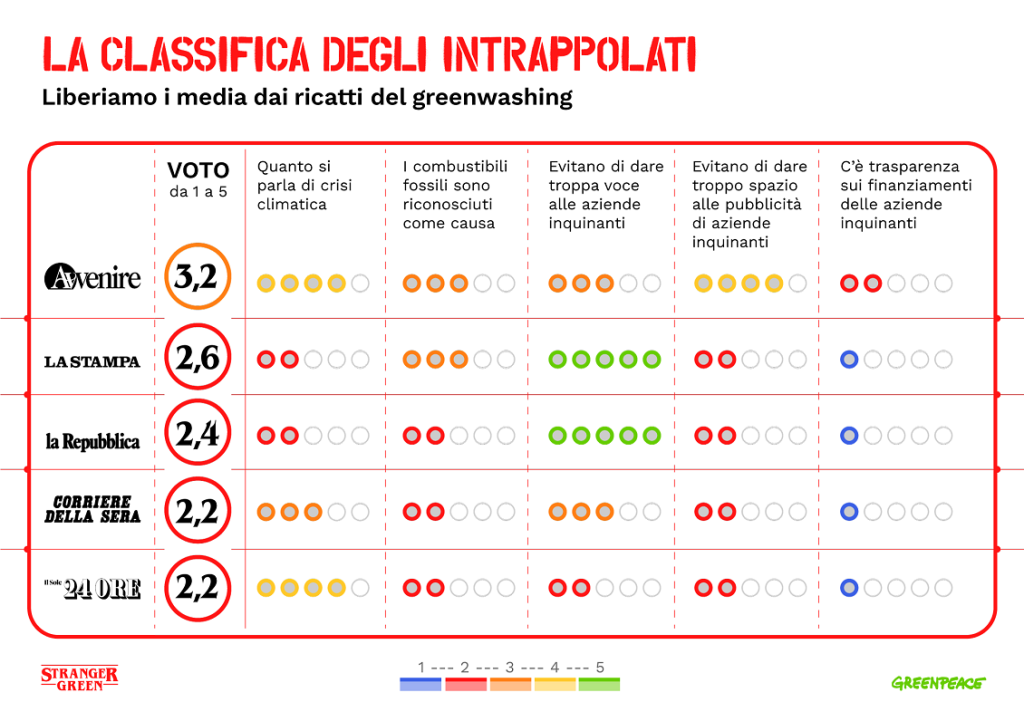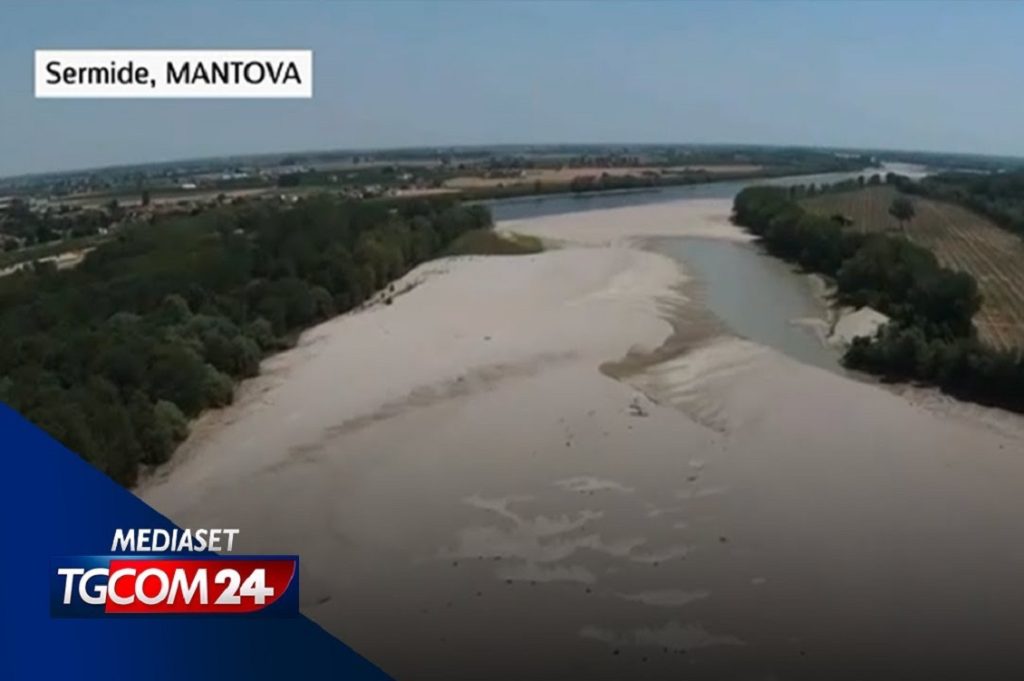Despite a summer plagued by extreme events, the climate crisis continues to find little space in newspapers and on television and is told by the Italian media as if it were not responsible, as proof of theenormous influence exerted by the fossil fuel industry on the world of information. This is what emerges from new study that Greenpeace Italy has entrusted to the Observatory of Paviaa research institute specializing in communication analysis, released today as the Sharm el-Sheik climate summit is underway COP27.
The study examined how, between May and August 2022, the climate crisis was covered by the paper editions of the five most popular national newspapers – Corriere della Sera, la Repubblica, Il Sole 24 Ore, Avvenire, La Stampa – from the evening news programs of the Rai, Mediaset and La7 networks and from a sample of in-depth television programmes.
The research updates the results of the monitoring of the media coverage of the climate crisis that Greenpeace and the Observatory of Pavia started last January. The results show that in the second quarter of the year the main Italian newspapers published an average of three articles a day explicitly discussing the climate crisis. It’s about a significant increase compared to the first quarterwith a peak in Julymainly due to concerns about drought and the heat waves that hit Italy, but still far from the attention that the most important environmental emergency of our time deserves.
On the other hand, the large space offered by newspapers to advertisements for the fossil fuel industry is confirmed and automotive, airline and cruise companies, which are among the major causes of global warming: in the Sole 24 Ore there are almost 5 advertisements for these polluting companies a week, while the average in all newspapers is over 3 advertisements a week . The influence of the economic world on the press also emerges by examining the way in which the main Italian newspapers report on the climate crisis. Indeed, in the articles dedicated to global warming, companies are confirmed as the subject that has the most voice overall (16.3%), surpassing experts (15.3%), politicians (12.8%) and associations environmentalists (12.2%).
As for the television insteadthe dramatic images of the drought and the tragedy of the Marmolada have encouraged the growing coverage by the early evening news, where the climate crisis was mentioned in around 2.5% of the news broadcasts. TG1 is the newscast that has devoted the most attention to the problem, while Enrico Mentana’s TG La7 did worst of all, which covered climate change just once a week.
The work of in-depth television programs was more comforting, in which space was given to the climate crisis in 104 of the 385 episodes monitored in the four months of the survey, equal to 27% of the total. The most virtuous transmission is One morning of Rai1, while at the bottom of the ranking are the two La7 broadcasts monitored: The air that blows And Half past eight/On the air.
The influence that oil and gas companies exercise on the Italian press is confirmed as a structural problem
Considering that the worst results are obtained by the news and in-depth programs of La7 and that the editorial line of this television channel favors the story of politics, the results appear as an indirect confirmation that Italian politicians are not interested in global warmingas already demonstrated by the substantive absence of the climate crisis from the speeches of party leaders during the last election campaign.
«The greater media attention observed in the second quarter of the year is a positive sign, but unfortunately it is largely due to the now visible impacts that the climate crisis has on the fragile Italian territoryin a crescendo of damage and victims that is even more unbearable in the face of political inaction», says Giancarlo Sturloni, communications manager of Greenpeace Italy.
«The influence that gas and oil companies exercise on the Italian press is also confirmed as a structural problem, dangerously addicted to advertisements stuffed with greenwashing that pollute information and prevent the public from knowing the truth about the climate emergency. This is also demonstrated by the fact that fossil fuels and gas and oil companies are rarely mentioned among the causes of global warming, despite being the main culprits: in the media narrative, the climate crisis remains largely a crime without culprits”. .

Greenpeace has updated the ranking of the main Italian newspapersevaluated through five parameters:
- How much they talk about the climate crisis
- If among the causes they cite fossil fuels
- How much voice do polluting companies have
- How much space is allowed for their ads
- If the newsrooms are transparent about the funding received from polluting companies
The latter parameter was evaluated with a questionnaire that Greenpeace sent to the directors of the five newspapers, to which only Avvenire partially replied. Considering the average of the five parameters, Avvenire achieves sufficient scores (3.2 points out of 5), while the scores of La Stampa (2.6) and Repubblica (2.4) are poor, while Corriere and Il Sole 24 Ore (2,2).
Newspaper ranking and media tracking are part of the countryside Stranger Green promoted by Greenpeace Italia against greenwashing and false solutions which delay the actions needed to address the ecological and climate crisis. The environmental association considers the role of journalism to be crucial, which must be free from the influences of polluting companies, to correctly inform citizens on the seriousness of the environmental emergency and to stimulate more ambitious policies in defense of people and the planet.
In addition to having commissioned and disseminated this very interesting report, Greenpeace has also put forward a proposal which, in its goliardic nature, identifies one of the Achilles’ heels that emerged from the same report, stimulating a reaction. The initiative is called “Mentana, give us a marathon for COP27!” and it is aimed precisely at the broadcaster that has dedicated less space to the climate emergency in recent months.
“Dear Enrico Mentana – reads the appeal of the environmental organization -, the climate crisis is the most important environmental emergency of our time: doesn’t it deserve a Mentana Marathon? Make the Greenpeace Italy video come true [che trovate qui sopra, ndr]dedicate one of your specials to COP27 and to the future of the planet!”.
Download the reports and the classification of the newspapers Here

